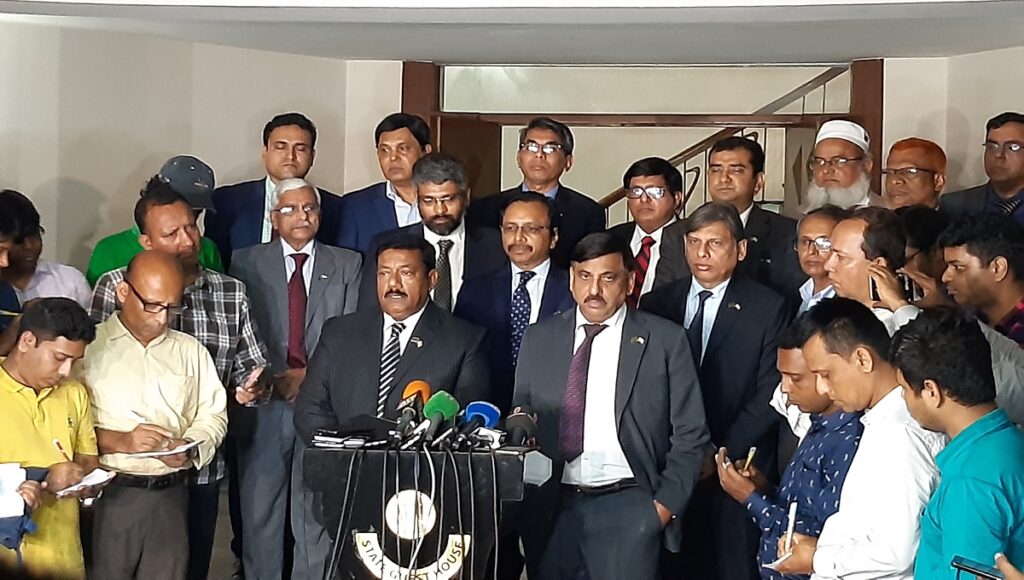7 common rivers’ water-sharing issues discussed
Dhaka, Aug 8 – Bangladesh and India on Thursday agreed to conduct a joint study on Ganges Barrage project and formed a technical committee to finalise the terms of reference (ToR) and constitute a larger panel to do the study to assess its impact on the environment and livelihood.Both sides also agreed to work on preparing a framework or interim water-sharing agreements on seven rivers — Manu, Muhuri, Khowai, Gumti, Dharla, Feni and Dudhkumar including Teesta – and hoped to see some progress by September 30.
The issues were discussed at a secretary-level meeting held at state guesthouse Meghna here. Indian Water Resources, River Development & Ganga Rejuvenation Ministry Secretary Upendra Prasad Singh and his Bangladesh counterpart Kabir Bin Anwar led their respective delegations.
“We’ve decided to have a joint study actually….there’re two parts – finalisation of ToR and composition of that committee,” Upendra Singh told reporters at a joint briefing.
The two sides will decide how much time it will take to do the study. “Right now we’re not in a position to say by what date the study would be completed,” said the Indian water resources secretary.
“We want to make a good start,” Bangladesh water resources secretary Anwar said adding that the issues related to barrage construction and its design will not come for discussions right now because they want to conduct the study first.
Asked whether the much-awaited Teesta water-sharing deal will be signed during Prime Minister Sheikh Hasina’s upcoming India visit, both the secretaries said it is difficult to say at this stage as the date of the visit is not finalised yet.
Both the countries also discussed Delta Plan issues as the Bangladesh team explained it to its Indian counterpart.
Upendra Singh said resuming secretary-level talks after a gap of eight years is the most important achievement of the meeting.
Terming water a top most agenda of India, he said more than 80 percent of rainfall both the countries get in just three-four months of monsoon. “We’ve to manage water for the whole year. It’s a big challenge actually.”
Giving much importance to water conservation, the Indian water resources secretary said the two countries have so far been basically stressing supply side management. “This is high time to start working on demand side management.”
Upendra Singh said both the countries agreed to update data on the rivers and remove the inconsistencies, if any.
The Indian official hoped that they would be able to update the data to the extent possible and remove those inconstancies.
On Ganges barrage project, Upendra Singh said they have no problem as far as the utilisation of water by constructing a barrage at whichever suitable place it is constructed. “India has absolutely no issue but two things we would like to do.”
Firstly, he said, how to maximise the benefits out of it for both the countries though major benefits would go to Bangladesh.
Secondly, Upendra Singh added, they would like to ensure that there is no adverse impact or minimise such impact as any intervention which they make on a river has implications.
He said two people from each side will sit together and decide the composition of a larger committee. “We may have to have engineers, hydrology experts, environmentalists….”
Anwar expressed satisfaction over the resumption of talks and hoped to see a minister-level Joint Rivers Commission (JRC) meeting soon.
The two countries also discussed the problems of pollution in trans-boundary rivers and other issues of mutual interest.
At the conclusion of the meeting, both sides signed the Joint Record of Discussions.
Later, the Indian Water Resource Secretary called on State Minister of Water Resources Zaheed Farooque, MP and Deputy Minister of Water Resources AKM Enamul Hoque Shameem.
He extended invitations from Gajendra Singh Shekhawat, Minister of Jal Shakti of India to the Bangladesh ministers to visit India.
The Bangladesh ministers thanked the Indian side for the invitations and agreed to undertake the visit at a mutually convenient date. – GreenWatch News Desk with UNB




